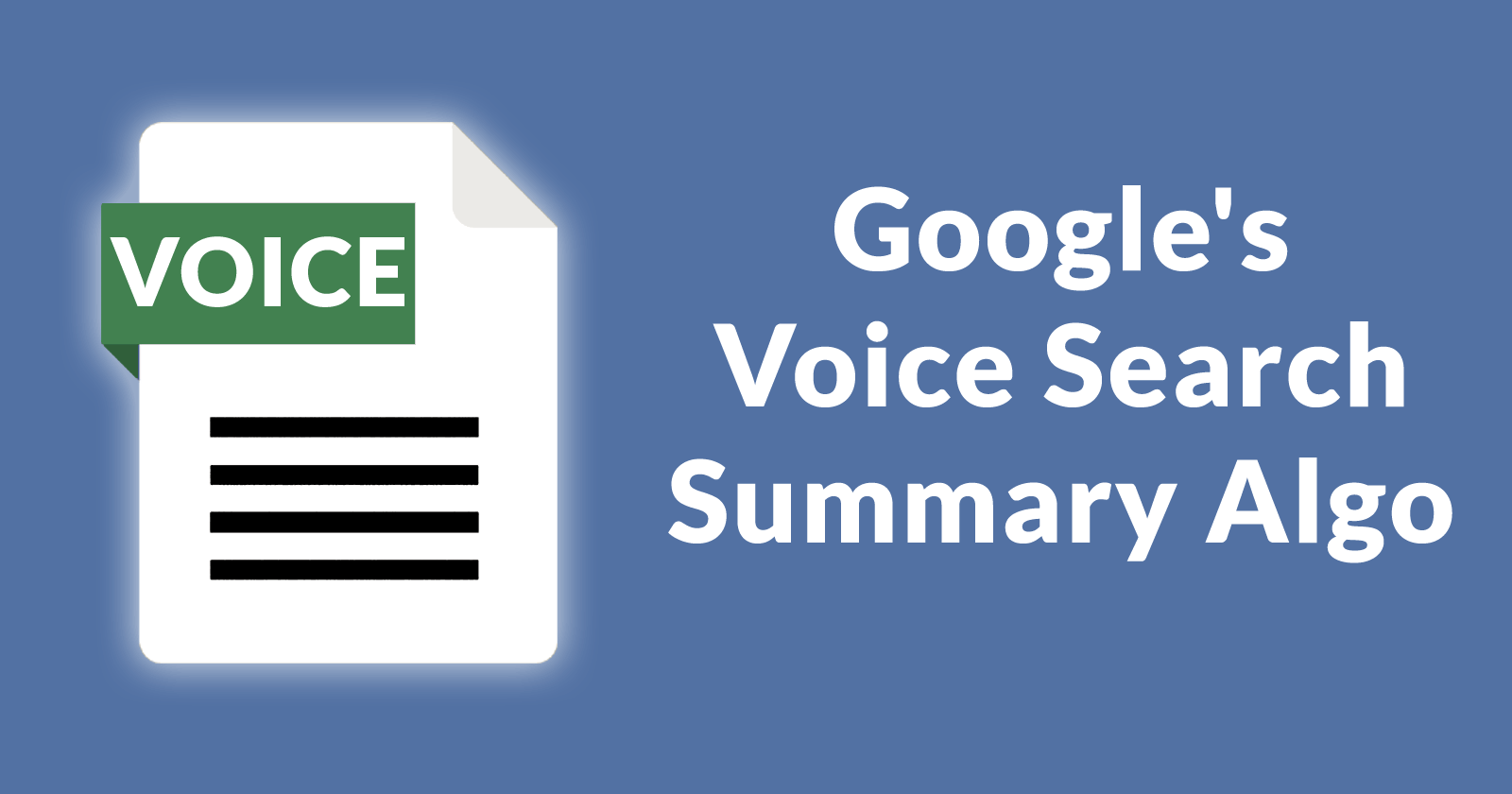Google Assistant and voice search, is increasingly gaining prominence. Voice search will be in your car, in your home and even on your Apple device. Search queries will likely shift toward voice search. Google has linked to a research document that explains how the summarizing algorithm works. Not all content works with it. Will your content be ready for the voice search environment?
In December 2017 Google announced the release of their Human raters guidelines for evaluating the algorithm that produces Google Assistant search results. When a user searches using the Google Assistant, the voice search algorithm will sometimes summarize the result in a spoken manner.
That announcement linked to a research paper that describes the algorithm behind the voice search summaries. The paper is called, Sentence Compression by Deletion with LSTMs (PDF).

The announcement also contained information that may be useful to understanding a part of the algorithm that is used to summarize content. It’s called a “compression system” because it removes words and phrases in order to obtain a useful summary.
The research document includes information indicating what kinds of content cannot be successfully summarized. It also details exactly what kinds of words and phrases are removed. This kind of information may be useful for publishers who may wish to publish content that can be easily summarized and shown in voice search. Considering how important voice search is becoming, it may be useful to understand how this works.
Four Elements of Voice Search Summaries
The Google Assistant announcement noted four elements that comprise their voice search summaries. There is likely a great deal more, but these are the elements that presumably correspond to various algorithms that were mentioned in the announcement:
Length
Summary of content that is appropriate when spoken.
User Satisfaction
The information meets the needs of the user/
Grammatical Correctness
Well formed sentences that make sense when spoken.
Elocution
This is a reference to good pronunciation by the Google Assistant software.
This article is concerned with how Google summarizes a paragraph of content and is able to speak it and give a display and a link to the full article.
How Voice Search Summarizes Content
According to the research paper, this algorithm doesn’t use explicit syntax features to understand what is being summarized. This is called, Part of Speech Tagging.
Instead, it “translates” the words into machine readable ones and zeros that represent what it calls “token deletion decisions.” This is pretty far out because it’s not using explicit syntactic information like parts of speech. Then the system removes certain words and phrases that it deems not neccesary in order to create a summary. This is called Compression.
Compression algorithms are very common. If you have ever received a file in a Zip format, then you have experience with a compression algorithm. In web search, search engines will remove common words like “the” in order to save space on their servers. When they save your content, the search engines are actually saving a compressed version of your content.
Google voice search summarizer works in a similar way. Only instead of removing words like “the,” Google’s summarizer is removing words and phrases to get to a summary.
“Our results clearly indicate that a compression model which is not given syntactic information explicitly in the form of features may still achieve competitive performance. The high readability and informativeness scores assigned by human raters support this claim.”
The researchers combined their method with grammatical features, identifying the parts of speech. One would think that this would improve the algorithm’s performance but it didn’t. The research paper notes this fact:
“Interestingly, there is no benefit in using the syntactic information… The simple LSTM model which only uses token embeddings to generate a sequence of deletion decisions significantly outperforms the baseline which was given not only embeddings but also syntactic and other features.”
Example of Content Summary
In order to understand how this works, the research paper shows examples of various sentences and paragraphs that were successfully summarized. This is how your own content will be summarized.
Original Content
“Alan Turing, known as the father of computer science, the codebreaker that helped win World War 2,
and the man tortured by the state for being gay, is to receive a pardon nearly 60 years after his death.”Summarized Content
“Alan Turing is to receive a pardon.”
What Parts of Speech are Removed?
Although the algorithm isn’t using parts of speech as an explicit feature, parts of speech are still being removed. That sounds a lot like Google is saying it’s not aliens but it’s aliens, doesn’t it? Here is what the document itself states:
How Should You Write Your Content?
You probably shouldn’t write your content especially for voice search. But understanding the kinds of content that couldn’t be summarized may help avoid not having your content summarized and ranked. Furthermore, it may be possible that the algorithms have progressed and no longer stumble as much.
Content with Quotes is Difficult to Summarize
Here is what the document identified as the kind of content it could not summarize:
“Sentences which pose difficulty to the model are the ones with quotes, intervening commas, or other uncommon punctuation patterns.”
Here is an example of content with quotes the algorithm couldn’t summarize:
Original Content
A Virginia state senator and one-time candidate for governor stabbed by his son said Friday that he is “alive so must live,” his first public statement since the assault and his son’s suicide shortly thereafter.Summary
State senator alive so must live.
The original sentence, in my opinion, could be written better. The research paper didn’t state if rewriting the sentence into two more sentences would help, so we can only guess. Although the paper identified the reason for failure as quotes, I can’t help wondering if rewriting that sentence would have been helpful.
I ran the above sentence through a grammar tool and the tool stated that the sentence was hard to read. There’s not enough data in order to give it a grade level so I simply repeated it. The tool scored it as college level, meaning that a reader needed a college level reading skills to understand it. The reason for that is because the sentence is so long. It could be divided into at least two sentences and perhaps the summarizer might be able to give it a proper summary. I don’t know for certain, but it may be helpful to create content that is easily read by the widest amount of people.
Content With Too Many Commas is Difficult to Summarize
Content with commas were identified as hard to summarize. This may mean that it’s important to write direct and easily read content. If you can read it aloud and it makes sense, you’re probably on the right track.
If you look at the example they give, it seems as if the problem isn’t the comma itself, but the amount of commas. See for yourself.
Original Content
Gwyneth Paltrow, 41 and husband Chris Martin, 37 are to separate after more than 10 years of marriage,
the actress announced on her website GOOP.Summarized Content
Gwyneth Paltrow are to separate.
What Causes Voice Search Summary to Fail?
Overall, the research indicated four kinds of features that made content not easily summarized:
- Commas
- Quotes
- Nothing to Remove
- Important Context (context of events are difficult to retain)
That last one about the context of events is a little hard to understand. Fortunately they provide an example.
Original Content
Just a week after a CISF trooper foiled a suicide bid by a woman in the Delhi metro, another woman
trooper from the same force prevented two women commuters from ending their lives, an official said Monday.Summarized Content
Another woman trooper prevented two women commuters
While the system does not use explicit grammar features, the algorithm did indeed learn to drop certain of them. This may not really be important to you as a content writer though. As long as your content is written with proper grammar then you probably should worry about your adjective and adverb use, as long as it’s properly grammatical.
Here is a list of the kinds of words and phrases commonly removed to achieve a voice search summary.
Appositions
These are words or phrases that have a direct relationship to each other. Wikipedia gives the following example:
Dean Martin, a very popular singer, will be performing at the Sands Hotel.
In the above example, the phrase “a very popular singer” is the appositive phrase. It can be removed and the sentence will still make sense.
Temporal Expressions
These are phrases related to time. These phrases communicate a point in time, a duration or how often. A point in time means anything that measures time, like dates or the hour.
Optional Modifiers
This is an element of grammar. To put it simply and without getting technical, optional modifiers are typically adjectives (which modify nouns) and adverbs (that modify verbs). Here’s more information if you want more detail.
Introductory Clauses
These are phrases that set up a statement, almost like an introduction. Purdue University provides this example of an introductory clause: “If they want to win, athletes must exercise every day.”
How to Optimize Content for Voice Search Summaries
There is no magic method for writing content for Google Assistant. Avoiding pitfalls like sentences that are too long or difficult to read may be useful. If you are unsure about your writing, perhaps a writing and grammar tool may be useful if you don’t have a human editor to proof read your content. The Voice Assistant announcement explicitly mentions factors such grammar, so it’s probably a good idea to have that correct from the beginning. Although we don’t know for certain, it may be helpful if your content sounds natural when read aloud.
Images by Shutterstock, modified by Author





